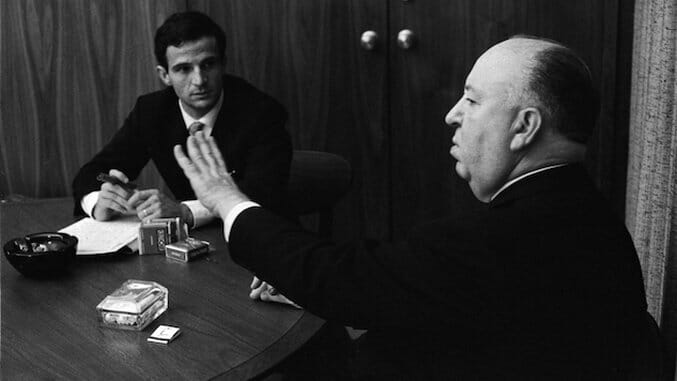Hitchcock/Truffaut

One of America’s greatest film scholars takes on the most influential film book ever written—and in the process celebrates two of the greatest directors who ever lived—in Hitchcock/Truffaut, a lively, spectacularly entertaining documentary by filmmaker, archivist and historian Kent Jones. Here’s the background: In 1962, French film critic and director Francois Truffaut wrote to one of his idols, American auteur Alfred Hitchcock. At the time, Truffaut was a critical darling thanks to a trio of early masterpieces: The 400 Blows, Shoot the Piano Player, and Jules and Jim. Hitchcock was one of the most successful and well-known directors in the world, yet few people outside of Truffaut and his colleagues at Cahiers du Cinema thought of “Hitch” as an artist. That was to change after Hitchcock accepted Truffaut’s written proposal: for Truffaut to spend a week interviewing Hitchcock in America for a book-length study of the director’s work.
The resulting publication, Hitchcock/Truffaut, not only sparked the beginning of a critical reevaluation of the master’s work but influenced generations of young directors around the globe. In an age of DVD commentaries and readily accessible interviews with filmmakers across the Internet, it’s probably hard for today’s film students and aspiring directors to comprehend the impact Truffaut’s book had, but at the time of its release—and for a good 20 years or so afterward—it was the only resource of its kind. No filmmaker had ever spoken in such detail, or with such clarity and sense of purpose, about their work, and thus Truffaut’s volume affected not only the world’s understanding of Hitchcock but of the art of cinema in general. It’s fair to say that, without it, we wouldn’t have many of the classics of the modern cinema—Taxi Driver, Se7en, Rushmore, etc.—or at least wouldn’t have them in the same way, since their creators were all deeply affected by Truffaut’s tome at an early age.
Those creators—Martin Scorsese, David Fincher and Wes Anderson—are among the interview subjects in Jones’ Hitchcock/Truffaut, which, like the book from which it takes its name, aims to use Hitchcock as a gateway drug for all the intoxicating pleasures the movies have to offer. And boy, does it succeed—viewers already familiar with Hitchcock’s work (as well as Truffaut’s) will be scrambling to revisit their old favorites and see them in a new light, while the uninitiated will leave the theater desperately scribbling down dozens of titles to hunt down for home viewing. Jones expertly combines a historical overview of the circumstances that led to Hitchcock and Truffaut’s friendship with generous portions of the original audio interviews, which are then illustrated by clips from the films under discussion and commented upon by directors who have been influenced by them. Scorsese, Fincher and Anderson are joined by James Gray, Olivier Assayas, Richard Linklater, Paul Schrader and others, all of whom offer personal but incisive reflections on both Hitchcock’s films and Truffaut’s book.